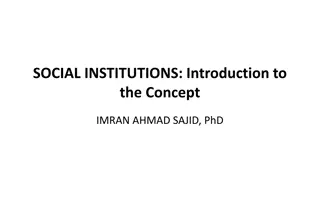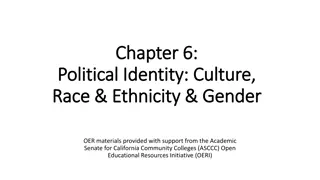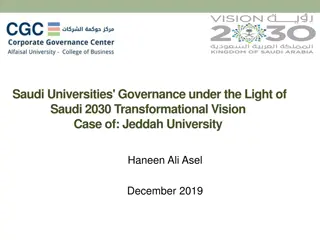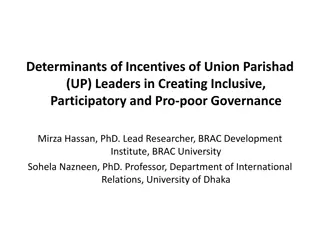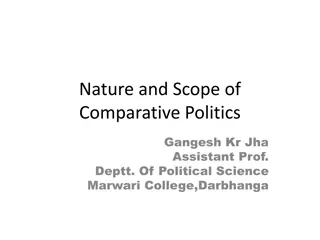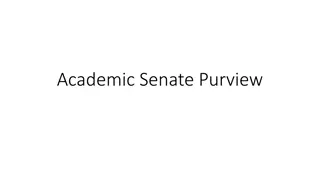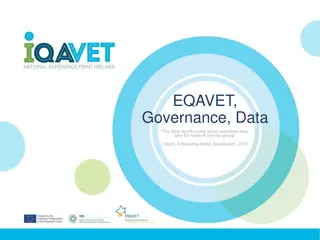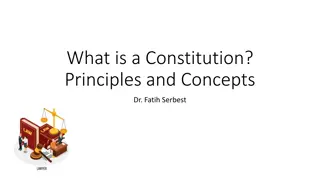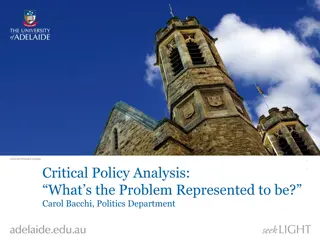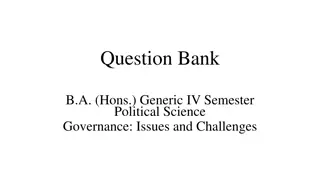Understanding Political Institutions and Their Significance in Governance
Dr. R.E.V. Gyampo, a lecturer in the Department of Political Science at UG College of Education, explains the concept of institutions, distinguishing between formal and informal ones. He emphasizes the importance of rules within institutions for predictability and behavior governance. The discussion covers the characteristics of institutionalism and explores political institutions such as chieftaincy, legislature, executive, judiciary, and political parties, shedding light on their impact on government and politics.
Download Presentation

Please find below an Image/Link to download the presentation.
The content on the website is provided AS IS for your information and personal use only. It may not be sold, licensed, or shared on other websites without obtaining consent from the author. Download presentation by click this link. If you encounter any issues during the download, it is possible that the publisher has removed the file from their server.
E N D
Presentation Transcript
Lecturer: Dr. R.E.V. GYAMPO, Department of Political Science, UG College of Education School of Continuing and Distance Education 2014/2015 2016/2017
Defining Institutions Institutions comprise norms, regulations and laws that establish the rules of the game (Diamond, 1995). Rules that serves as a guide to the behaviour of individuals and groups so that their actions become more predictable to others. Organizations are not necessarily synonymous with institutions The deciding factor is whether there are rules Slide 2 Dr. R.E.V. GYAMPO, Dept of Political Science, UG
Types of Institutions Formal and informal institutions Informal institutions also referred to as dysfunctional rules Examples of Formal institutions include: laws contracts Constitutions Electoral rules Separation of Powers . Slide 3 Dr. R.E.V GYAMPO, Dept of Political Science, UG
Types of Institutions Informal institutions also include: Norms, Customs and Conventions Patron-Client Relations Spousal Relations Old-Boyism Ethnic cleavages Slide 4 Dr. R.E.V. GYAMPO Dept of Political Science, UG
The Characteristics/ Central argument of institutionalism There should be rules The rules should be well known The rules must be enforced The rules must be internalized The rules must be predictable Slide 5 Dr. R.E.V GYAMPO, Dept of Political Science
What are Political Institutions and types Political institutions are those state institutions that have a direct bearing in the conduct of government and politics. They may be traditional like chieftaincy Slide 6 Dr. R.E.V, GYAMPO, Dept of Political Science, UG
What are Political Institutions and types Contd Political institutions may also be modern such as the legislature, executive, judiciary, political parties etc Slide 7 Dr. R.V.E GYAMPO, Dept of Political Science, UG
What are Political Institutions and types Contd Slide 8 Dr. R.E.V GYAMPO Dept of Political Science, UG
What are Political Institutions and types Slide 9 Dr. R.E.V. GYAMPO Dept of Political Science, UG
The Role of Political Institutions Shaping social relations Avoiding uncertainties Restraining the exercise of power Predicting the outcome of Political Action Slide 10 Dr. R.E.V. GYAMPO Dept of Political Science, UG
Making Political Institutions Effective Political institutions in many African countries are weak, ineffective or moribund There may be fine rules that are expected to govern the activities of these institutions Nevertheless, the rules are simply kept on the shelves to gather dust- THEY ARE NOT IMPLEMENTED Political institutions can only be made effective when the rules of the game are allowed to work without fear or favour; internalized and made predictable. Slide 11 Dr. R.E.V. GYAMPO Dept of Political Science, UG
Reading list Gyampo, R.E.V. The state of Political Institutions in Ghana, (Saarbrucken, Germany: Lambert Academic Publishing Inc. 2012) pp 1-50 March, J. and Olsen, J. Elaborating the new Institutionalism , In Rhodes, R.A W; Binder, S.A. and Rockman, B.A. The Oxford Handbook of Political Institutions (New York: Oxford University Press, 2006).pp 3-22 Slide 12 Dr. R.E.V. GYAMPO Dept of Political Science, UG
Reading List See suggested reading list in modules and Study guide The following are however essential: Gyampo, R.E.V. The state of Political Institutions in Ghana, (Saarbrucken, Germany: Lambert Academic Publishing Inc. 2012) Rhodes, R.A W; Binder, S.A. and Rockman, B.A. The Oxford Handbook of Political Institutions (New York: Oxford University Press, 2006). Slide 13 Dr. R.E.V. GYAMPO Dept of Political Science, UG
Concluding Remark Brace yourself for Lecture 2 which delves into the nature and scope of institutions THANK YOU Slide 14 Dr. R.E.V. GYAMPO Dept of Political Science, UG













